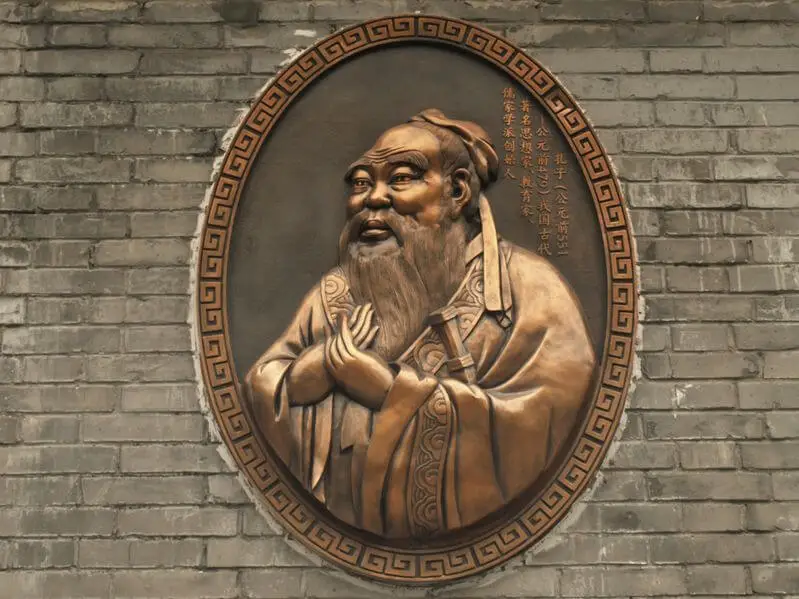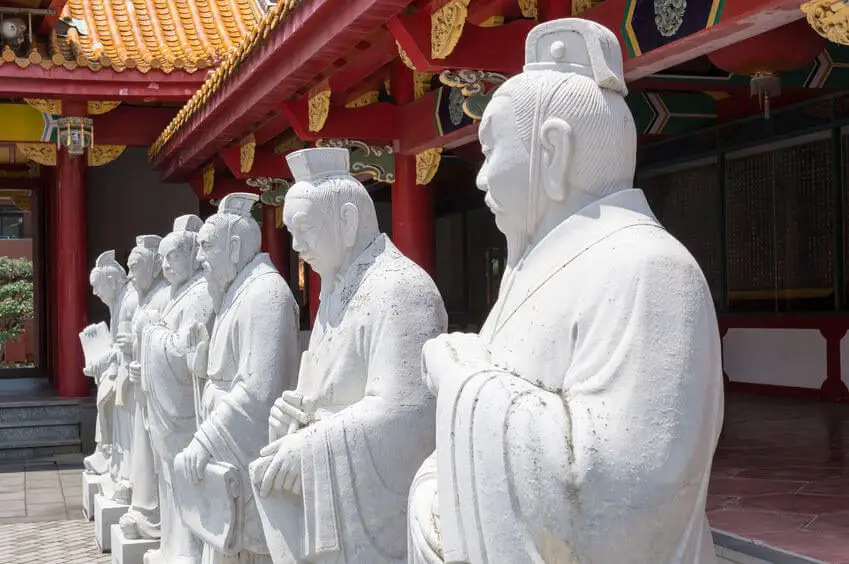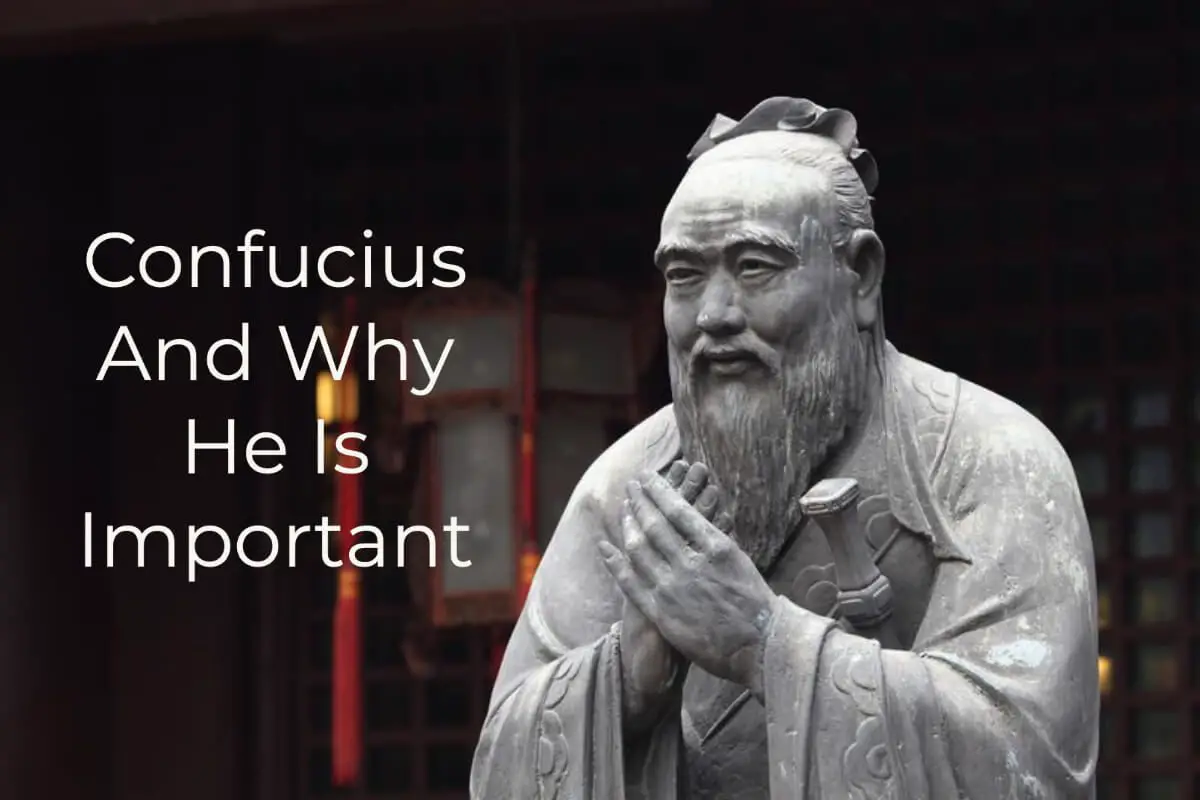Years ago, when traveling in China, I visited Confucius’s house, temple, and cemetery. Today his house, temple, and cemetery are popular tourist destinations.
Confucius was a renowned Chinese philosopher, politician, and educator. He lived over 2,500 years ago, yet his social and moral beliefs still influence many parts of Asia today. During his lifetime, he had a group of disciples and wrote what is known as the Analects. No other person in China has affected the world as much as Confucius.
Table of Contents
- All About the Chinese Philosopher Confucius
- Importance of Confucius And Confucianism Today
- Related Questions
My grandfather, Arthur W Hummel, was a well-known Chinese scholar who worked for many years for the Library of Congress. He translated many of the Confucius Analects into the English language. If you are interested in his private Chinese proverb collection, you can read Over 175 Inspirational Chinese Proverbs On Life And Living by clicking here.
All About the Chinese Philosopher Confucius
Confucius is best described as a renowned philosopher, politician, and educator who lived in ancient China. His beliefs touched upon philosophy, politics, and ethics; today, his teachings are known as Confucianism.
Confucius’s work and way of thinking have profoundly influenced Chinese culture. Many Chinese emperors revered him as a sacred model teacher for 10,000 generations.
The question many want to understand is how a man born to the name Kong Qiu in 551 BCE became so powerful and affected Chinese culture. The moral and social code that Confucius taught is still important in many parts of Asia, including China, Korea, Taiwan, Hong Kong, Japan, and Vietnam.

Interesting Facts About Confucius
Here are some interesting facts about Confucius and his life. As you read through these facts, you will notice that Confucius was an ordinary man with a genius of thought that inspired and taught many disciples. His disciples and writings helped ensure that Confucius’s legacy continued for 2,500 years.
- Confucius’s original name was Kong Qiu.
- His literary name was Zhongni.
- Confucius lived in 551 BCE and died in 479 BCE.
- The Confucius house, temple, and cemetery are in Qufu, in Shangdong Province in China; the area is revered as a UNESCO world heritage site.
- Confucius is China’s most famous teacher, philosopher, and political theorist; a theorist is a person who considers the facts and then comes up with a possible explanation.
- Confucius profoundly affected Chinese civilization and other East Asian countries like Korea, Japan, Taiwan, Hong Kong, and Vietnam.
- Confucius’s early ancestors, or the Kung family, were aristocratic, but by the 7th century BCE, the family had lost its political standing and wealth.
- The Kung family was considered gentlemen or Shi. That means being educated in the six traditional arts, like music, archery, charioteering, writing, and arithmetic.
- Even though educated gentlemen, the Kung family, for the social hierarchy of the day, were just slightly above the common folk.
- Confucius’s father was quite old when Confucius was born, as this was a second marriage. His father had nine daughters and one son who had a club foot; finally, with the birth of Confucius, he could have a proper heir.
- Confucius’s father died when Confucius was young, so he was raised by his mother.
- Confucius was always very candid about his family background; in fact, he said he was “poor, and from a lowly station, so (he) had to be skilled in menial things” (Analects 9:6). Because of his social standing, he could not directly enter government service.
- Due to his lack of social standing, Confucius had to work his way up in life. Eventually, he was able to obtain some government work.
- During his early government work, Confucius became so well-known for effectively handling problems and diplomatic relations; he became an excellent negotiator.
- Eventually, Confucius was forced to leave his position and underwent self-exile. His journey of self-exile lasted 14 years, but during this time, he spent most of his journey looking for rulers willing to accept his philosophy, influence, and vision about politics and government. Even though this first journey was unsuccessful, he never gave up on finding someone who would listen to him and his ideas.
- Changes in the government allowed him to return to government service. Confucius worked very hard and exert influence for his ideas and ways of thinking.
- Confusion looked back to the ancient writings for inspiration; for him, history was his guide. The one person he looked back to was Zhougong, a political figure during the Zhou Dynasty. Confucius believed that he and Zhougong wanted the same things – social harmony, political stability grounded in trust, and mutual moral obligations.
- Confucius had some important disciples, many of them much younger than him. These disciples followed him and believed his teachings. His disciples came from a wide range of social classes, such as sons of Aristocats, children of gentlemen, merchants, farmers, artisans, and even criminals and sons of criminals. All of these disciples deeply believed in what Confucius was teaching them.
- Confucius’s disciples left behind their homes, families, and career opportunities to journey with Confucius to spread his doctrine, vision, and philosophy. This journey lasted for many years as Confucius and his disciples went from state to state.
- Upon his return from his journey, the government made Confucius “states elder.”
- Many would come to Confucius and his disciples to ask moral questions on virtue, moral and ethical issues, or the meaning of certain words and phrases; Confucius became known as a great teacher.
- Until the very end of his life, Confucius continued to teach. His thoughts and philosophy are in The Book of Analects.
- Confucius died at the age of 73 in 479 BCE.
The Book of Analects
Confucius and his disciples left important writings of his thought, teaching and philosophy called the Book of Analects. The Book of Analect is a fragmented collection of Confucius’s life and thoughts; the book is divided into 20 sections. It is also known as the Analects of Confucius or simply Analects.
The sections in the Book of Analects contain descriptions of Confucius’s character and moments of his life in exile or at home. It also includes conversations he had with others, such as his disciples.
This book of Analect is not a story you can read from cover to cover; instead, it is a collection of many of Confucius’s sayings and ideas. This book is believed to have been compiled and written by some of Confucius’s disciples and followers.
A handful of Confucius’s young disciples initiated the project of the Analects. But it was really another 200 to 300 years later, after some passages were omitted and others modified, that the Analects became known as it is today.
In other words, like many other important authors. Confucius never understood during his lifetime the influence he would have upon China and East Asia. This influence happened because his thoughts, sayings, and writings were left in the form of some books, but most importantly, the Book of Analects.
Confucius’s Own Family and Women
As an interesting note, as Confucius spent most of his life traveling with his disciples, the Analects does not mention his family. We know that Confucius was married and had a son and daughter; we do not know much about his wife.
Many find that odd as Confucius was a great believer that the family unit was the foundation of society, yet he spent most of his life with his disciples. We do not know whether his family traveled with him or whether his wife was alive or had passed away; there is not much written about his family.
One criticism of Confucius’s teaching is how women are treated and viewed. In Confucian societies, giving birth to a son is favored with more importance than a daughter.
Confucianism and Confucius’s teachings are usually referred to as why Asian women were not treated very well in many parts of Asia. Confucius did not say much about women, but what he said was not very positive.

Interesting Facts About Confucianism
Confucianism is the ancient Chinese belief system that focuses on the importance of personal ethics and morality. It is a philosophy and belief system from Ancient China. Confucianism is important as it laid the foundation for the belief system of Ancient China.
Here Are Some Interesting And Important Facts About Confucianism.
- Confucianism is a western term that has no counterpart in the Chinese language.
- Confucianism is practiced worldwide because it includes thoughts on social ethics and political ideology.
- Confucianism believes that the family unit is the foundation of society.
- Confucianism believes in filial piety to family and elderly family members; filial piety is the Confucianism attitude of obedience, devotion, and care toward your family.
- Confucianism is sometimes referred to as a philosophy and moral code. This is very different from Christianity, which believes in Jesus Christ and is always viewed as a religion.
- Confucianism is a way of life and moral thought and not a religion. People who follow or believe in Confucianism also profess to be Buddhists, Muslims, or Christians. For example, when a person converts to Christianity, they will not cease believing in Confucianism thought. This is because Confucianism is about social morality or a way of life.
- Confucianism is a moral code ingrained in the societies of China and East Asia.
- Confucianism spread under the influence of Chinese literature and culture and profoundly influenced the spiritual and political lives of many of China’s neighbors, including Korea, Japan, and Vietnam.
- Confucianism is about how we live in society and human interactions between individuals, communities, and nations.
- Confucianism believes that people should do the right thing as it is the right thing to do, and doing the right thing, helps society as a whole.
Importance of Confucius And Confucianism Today
Confucius is important because his teachings continue to impact a quarter of the world’s population. Confucious teachings remain central in the moral code of how societies live together and interact with one another politically, morally, and socially.
To understand Asia, you need to understand a bit about Confucius and his teachings. Most of the cultural aspects in Asia can be seen as part of Confucianism as bowing, ancestor worship, family, and social and political relationships.
In many parts of Asia, parents must be given total respect and ultimate authority. That is why you may still see some Asians who will marry who their parents tell them to marry.
The Koreans have a traditional Korean wedding ceremony called Paebaek; the bride and groom will take a low bow in front of their parents to receive a blessing for the marriage. The parents would then toss walnuts and dates at the bride’s skirt to encourage fertility.
Confucius spoke about obedience to the emperor, social hierarchy, and having complete loyalty. Confucianism believes what is good for the individual is not always good for society, so people need to look at what is good for society, not just the individual.
Confucian thought affects how people interact with each other even today. This is why in the Confucian-based countries in Asia, when people are asked to wear masks, most do without complaining or feeling their “individual rights” are being violated. This is because Confucius thought about a harmonious society.
Confucius is important because he was a man that lived thousands of years ago, yet he continues to have this dramatic effect on the lives of nearly a quarter of humanity. Confucian teachings continue to shape and touch everyday people’s human and social relationships. Confucius thought affects how people view their rulers, government, political power, and social norms.
Confucius continues to influence even the younger Asian generation. I have seen people study a subject at a University because it is something their parents want them to study, not something they had a talent or interest in.
Because Confucianism and Confucius’s thoughts affect so many aspects of society in China and Asia, it can not be discounted. Understanding a bit about Confucianism is the first step to understanding Asia.
At A Bus On A Dusty Road, we talk about travel, life, and ex-pat living. We are all about “Living Life As A Global Citizen.” We explore social, cultural, and economic issues and travel.
We would love to have you be part of our community. Sign up for our newsletter to keep up-to-date by clicking here. If you have any questions, you can contact me, Anita, by clicking here.
Listen to our Podcast called Dusty Roads. You can find it on all major podcast platforms. Try out listening to one of our podcasts by clicking here.
Subscribe to our A Bus On A Dusty Road YouTube Channel with great videos and information by clicking here.
Related Questions
What is Marxism?
Marxism is the political, social, and economic theory named after Karl Marx. A major contributor to Marxism was Friedrich Engels. Marx and Engel’s economic theory examines capitalism’s effect on labor, productivity, society, and overall economic development. They believe the relationship between the capitalist or business owners and the workers or laborers is exploitative, and the workers are always at a disadvantage.
You can learn more by reading What is Marxism? The Marxist Thought Explained In Simple Terms by clicking here.
What Is The Vietnamese Propaganda Art?
Propaganda posters first started in the Soviet Union and then spread to other socialist countries like Vietnam. For many years, posters have been an important part of the Vietnamese art scene. You can still see the propaganda art posters around Vietnam.
You can discover more by reading our blog, Vietnamese Propaganda Art, All You Need To Know by clicking here.

